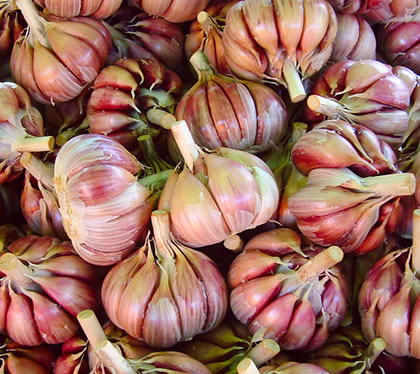Garlic helps lower blood sugar and may be used (under a doctor’s supervision) by people with diabetes in addition to their regular regime of insulin and special diets. Researchers have found that certain compounds in garlic such as allicin, allyl propyl disulfide and S-allyl cysteine sulfoxide work by increasing the amount of insulin in the blood by blocking the liver’s inactivation of insulin, making more insulin available to the body.
While more research is still needed to know the full extent of garlic’s effectiveness, diabetic patients may benefit by taking moderate amounts of garlic as a supplement: raw and cooked garlic or aged garlic extract not only can help regulate blood glucose, but also possibly prevent or lessen the effects of some of the complications of diabetes. Among the complications of diabetes may include high blood pressure, heart disease and stroke, arteriosclerosis, kidney disease and kidney failure (requiring dialysis or kidney transplant), nervous system damage, amputations and blindness. The following is a partial list of the health benefits of garlic or its constituents for diabetics:
- Lowers glucose levels in the blood
- Combats or prevents arteriosclerosis
- Fights infections
- Strengthens the immune system
- Lowers bad cholesterol
- Regulates blood pressure
- Fights or prevents heart disease
- Promotes blood flow
Note:
Diabetes is on the rise around the world, not only as a result of an increased aging population, but also due to the rising prevalence of obesity. According to the International Diabetes Federation more than 380 million people in the world could have the disease by 2025. Currently, according to statistics from the American Diabetes Association, in the U.S. alone, over 25.8 million people are diabetic, with approximately 79 million calculated to be pre-diabetic. In 2007 diabetes was the underlying or contributory cause of 231,404 deaths in the U.S.
Precaution: Discuss with your doctor or medical professional the advisability of taking garlic for your type of diabetes and health conditions. Although garlic is not considered toxic as a food by the American Food and Drug Administration, it may cause side effects for certain individuals and for anyone taking it in large quantities. When taking medicinal amounts, a doctor’s supervision is essential for patients with brittle diabetes.
